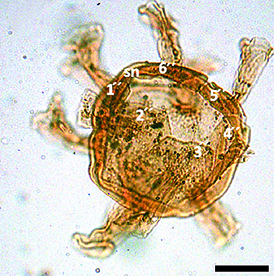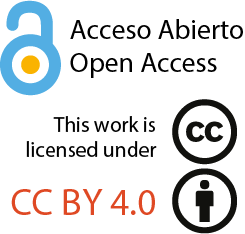A NEW CAMPANIAN DINOFLAGELLATE CYST FROM ANTARCTICA: A BIOSTRATIGRAPHIC AND PALEOECOLOGICAL KEY SPECIES
DOI:
https://doi.org/10.5710/PEAPA.15.02.2024.487Keywords:
Marine Palynology, Offshore paleoenvironments, Biostratigra´phy, Late Cretaceous, James Ross Basin, Antarctic PeninsulaAbstract
Palynological analysis of Upper Cretaceous marine rocks from the Rabot and Snow Hill Island formations, James Ross Basin, northeastern Antarctic Peninsula, has revealed the record of a previously undescribed dinoflagellate cyst species, previously assigned to Oligosphaeridium sp. A. Here, we provide a formal description of this new species, which we name Stiphrosphaeridium sobralii sp. nov. and we add some features to the description of the genus Stiphrosphaeridium. The new species is found in
Campanian strata, which are calibrated with magnetostratigraphic data. It is considered an important Late Cretaceous biostratigraphic marker commonly recorded in offshore environments of Antarctica.
References
Adamonis, S., Caramés, A., Amenábar, C. R., Ballent, S., Concheyro, A., Lirio, J. M and Mackern, A. (2010). Microfósiles calcáreos y palinomorfos de la Diamictita Punta Ekelöf, Mioceno-Plioceno, isla James Ross, Antártida. Actas del X Congreso Argentino de Paleontología y Bioestratigrafía y VII Congreso Latinoamericano de Paleontología (pp. 85), La Plata.
Amenábar, C. R. and Lirio, J. M. (2015). Resultados palinológicos preliminares de la Formación Rabot (Cretácico Superior), en Punta Rabot, sudeste de la Isla James Ross, Península Antártica. Libro de resúmenes del VIII Congreso Latinoamericano de Ciencia Antártica (pp. 117–120), Montevideo.
Amenábar, C. R., Caramés, A., Lescano and M. Concheyro, A. (2014). Palinología y micropaleontología del Cretácico de la Cuenca James Ross, Antártida. Estado actual del conocimiento. Boletín Geológico y Minero, 125, 493–559.
Askin, R. A. (1983). Campanian palynomorphs from James Ross and Vega Islands, Antarctic Peninsula. Antarctic Journal of the United States, 18(5), 63–65.
Below, R. (1982). Rigaudella, ein neues Genus von Dinoflagellaten-Zysten. Neues Jahrbuch für Geologie und Paläontologie, Monatshefte, 3, 137-150.
Brenner, W. (1988). Dinoflagellaten aus dem unteren Malm (oberer Jura) von Süddeutschland; Morphologie, Ökologie, Stratigraphie. Tübinger Mikropaläontologische Mitteilungen, 6, 1–116.
Bütschli, O. (1885). Erster Band. Protozoa. In H. G. Bronn's Klassen und Ordnungen des Thier-Reichs (Eds.), Wissenschaftlich dargestellt in Wort und Bild (pp. 865–1088). Winter'sche Verlagsbuchhandlung, Leipzig and Heidelberg, Germany.
Caramés, A., Amenábar, C. R. and Concheyro, A. (2016). Upper Cretaceous foraminifera and palynomorphs from Ekelöf Coast section, Ekelöf Point, eastern James Ross Island, Antarctic Peninsula. Ameghiniana, 53, 333–357.
Carvalho, M. A., Cabral Ramos, R. R., Crud, M. B., Witovisk, L., Kellner, A. W. A., Silva, H. P., Grillo, O. N., Riff, D. and Romano, P. S. R. (2013). Palynofacies as indicators of paleoenvironmental changes in a Cretaceous succession from the Larsen Basin, James Ross Island, Antarctica. Sedimentary Geology, 295, 53–66.
Cookson, I. C. and Eisenack, A. (1958). Microplankton from Australian and New Guinea Upper Mesozoic sediments. Proceedings of the Royal Society of Victoria, 70(1), 19–79.
Cranwell, L. M. (1966). Senonian dinoflagellates and microspores from Snow Hill and Seymour Island. Journal of the Arizona Academy of Science, 4, 136.
da Silva, L. C. F., Santos, A., Fauth, G., Manríquez, L. M. E., Kochhann, K. G. D., do Monte Guerra, R., Horodyski, R. S., Villegas-Martín, J. and da Silva, R. R. (2023). High-latitude Cretaceous–Paleogene transition: New paleoenvironmental and paleoclimatic insights 1077 from Seymour Island, Antarctica. Marine Micropaleontology, 180, 102214. https://doi.org/10.1016/j.marmicro.2023.102214
Davey, R. J. (1982). Dinocyst stratigraphy of the latest Jurassic to Early Cretaceous of the Haldager No. 1 borehole, Denmark. Danmarks Geologiske Undersøgelse, Series B, 6, 1–57.
Davey, R. J. and Williams, G. L. (1966). V. The genus Hystrichosphaeridium and its allies. In R. Davey, C. Downie, W. A. S. Sarjeant, and G. L. Williams. Studies on Mesozoic and Cainozoic dinoflagellate cysts (Bulletin, Supplement 3, pp. 53–106). British Museum (Natural History) Geology.
Davey, R. J., Downie, C., Sarjeant, W. A. S. and Williams, G. L. (1966). VII. Fossil dinoflagellate cysts attributed to Baltisphaeridium. In R. Davey, C. Downie, W. A. S. Sarjeant, and G. L. Williams, Studies on Mesozoic and Cainozoic dinoflagellate cysts (Bulletin, Supplement 3, pp.157–175). British Museum (Natural History) Geology.
Deflandre, G. (1937). Microfossiles des silex crétacés. Deuxième partie. Flagellés incertae sedis. Hystrichosphaeridés. Sarcodinés. Organismes divers. Annales de paléontologie, 26, 51–103.
del Valle, R. A., Fourcade, N. H. and Medina, F. A. (1983). Geología del extremo norte del borde oriental de la península antártica e islas adyacentes entre los 63° 25' y los 65° 15' de latitud sur. Dirección Nacional del Antártico, Instituto Antártico Argentino.
Dettmann, M. E. and Thomson, M. R. A. (1987). Cretaceous palynomorphs from the James Ross Island area, Antarctica–a pilot study. British Antarctic Survey B, 77, 13–59.
Lentin, J. K. and Williams, G. L. (1985). Fossil dinoflagellates: index to genera and species, 1985 edition. Canadian Technical Report of Hydrography and Ocean Sciences, 60, 451 p.
Lindemann, E. (1928). Abteilung Peridineae (Dinoflagellatae). In A. Engler and K. Prantl (Eds.), Die Natürlichen Pflanzenfamilien nebst ihren Gattungen und wichtigeren Arten insbesondere den Nutzpflanzen. Zweite stark vermehrte und verbesserte Auflage herausgegeben von A. Engler (2 Band, pp. 3–104). Leipzig, Wilhelm Engelmann.
Lirio, J. M., Marenssi, S. A., Santillana, S. N., Marshall, P. and Rinaldi, C. A. (1989). Marambio Group at Southeastern part of James Ross Island, Antarctica. Instituto Antártico Argentino, Contribución, 371, 1–46.
Lirio, J. M., Núñez, H. J., Bertels-Psotka, A. and del Valle, R. A. (2003). Diamictos fosilíferos (Mioceno-Pleistoceno): Formaciones Belén, Gage y Terrapin en la isla James Ross, Antártida. Revista de la Asociación Geológica Argentina, 58(3), 298–310.
Fauconnier, D. and Masure, E. (2004). Les dinoflagellés fossile. Guide pratique de détermination. Les genres à processus et à archéopyle apical. BRGM Editions.
Fauth, G., Seeling, J. and Luther, A. (2003). Campanian (Upper Cretaceous) ostracods from southern James Ross Island, Antarctica. Micropaleontology, 49, 95–107.
Fensome, R. A., Gocht, H., Stover, L. E. and Williams, G. L. (1993). The Eisenack Catalog of Fossil Dinoflagellates (New Series, Volume 2, pp.829–1461). E. Schweizerbart'sche Verlagsbuchhandlung, Stuttgart, Germany.
Fensome, R. A, Williams, G. L. and MacRae, R. A. (2019b). The Lentin and Williams index of fossil dinoflagellates 2019 edition. American Association of Stratigraphic Palynologists, Contribution Series, 50, 1173.
Gradstein, F. M., Ogg, J. G., Schmitz, M. D. and Ogg, G. M. (2012). The Geologic Time Scale 2012. Elsevier, Amsterdam.
Guerrero-Murcia, L. A., Helenes, J., di Pasquo, M. and Martin, J. (2023). Dinoflagellate cysts from the Upper Cretaceous (Campanian–Maastrichtian) from The Naze Peninsula, James Ross Island, Antarctica, Cretaceous Research, 141, 105367.
Helby, R., Morgan, N. and Partridge, D. (1987). A palynological zonation of the Australian Mesozoic. In: Jell, P.A. (Ed.), Studies in Australian Mesozoic palynology. Memoir of the Association of Australasian Palaeontologists, 4, 1–94.
Keating, J. M. (1992). Palynology of the Lachman Crags Member, Santa Maria Formation (Upper Cretaceous) of north-west James Ross Island. Antarctic Science, 4, 293–304.
Keating, J. M., Spencer-Jones, M. and Newham, S. (1992). The stratigraphical palynology of the Kotick Point and Whisky Bay Formation, Gustav Group Cretaceous, James Ross Island. Antarctic Sciences, 4, 279–292.
Klement, K. W. (1960). Dinoflagellaten und Hystrichosphaerideen aus dem unteren und mittleren Malm Südwestdeutschlands. Palaeontographica, Abteilung A, 114(1–4), 1–104.
Marenssi, S. A., Lirio, J. M., Santillana, S., Martinioni, D. R. and Palamarczuk, S. (1992). El Cretácico Superior del sudeste de la isla James Ross, Antártida. In: Rinaldi, C.A. (Ed.), Geología de La Isla James Ross (pp. 89–99). Instituto Antártico Argentino.
Milanese, F. N., Olivero, E. B., Kirschvink, J. L. and Rapalini, A. E. (2017). Magnetostratigraphy of the Rabot Formation, Upper Cretaceous, James Ross Basin, Antarctic Peninsula. Cretaceous Research, 72, 172–187.
Milanese, F. N., Olivero, E. B., Raffi, M. E., Franceschinis, P. R., Gallo, L. C., Skinner, S. M., Mitchell, R. N., Kirschvink, J. L. and Rapalini, A. E. (2019). Mid Campanian-Lower Maastrichtian magnetostratigraphy of the James Ross Basin, Antarctica: Chronostratigraphical implications. Basin Research, 31, 562–583.
Milanese, F. N., Olivero, E. B., Slotznick, S. P., Tobin, T. S., Raffi, M. E., Skinner, S. M., Kirschvink, J. L., Rapalini. A. E. (2020). Coniacian-Campanian magnetostratigraphy of the Marambio Group: The Santonian-Campanian boundary in the Antarctic Peninsula and the complete Upper Cretaceous – Lowermost Paleogene chronostratigraphical framework for the James Ross Basin. Palaeogeography, Palaeoclimatology, Palaeoecology, 555, 109871, https://doi.org/10.1016/j.palaeo.2020.109871
Nelson, P. H. (1975). The James Ross Island Volcanic Group of north-east Graham Land. British Antarctic Survey Scientific Reports, 54, 1–62.
Nelson A. E., Smellie, J. L., Hambrey, M. J., Williams, M., Vautravers, M., Salzmann, U., McArthur, J. M. and Regelous, M. (2009). Neogene glacigenic debris flows on James Ross Island, northern Antarctic Peninsula, and their implications for regional climate history. Quaternary Science Reviews, 28, 3138–3160.
Ogg, J. G., Ogg, G. M. and Gradstein, F. M. (2016). A Concise Geologic Time Scale: 2016. Elsevier B.V, Amsterdam, Oxford, Cambridge.
Olivero, E. B. (2012). Sedimentary cycles, ammonite diversity and palaeoenvironmental changes in the Upper Cretaceous Marambio Group, Antarctica. Cretaceous Research, 34, 348–366.
Olivero, E. B., Scasso, R. A. and Rinaldi, C. A. (1986). Revision of the Marambio Group, James Ross Island, Antarctica. Instituto Antártico Argentino, Contribución, 331, 1–30.
Palamarczuk, S. (1993). Bioestratigrafía de dinoflagelados del Cretácico Superior en las islas James Ross y Vega, Antártida. Segundas Jornadas de Comunicaciones sobre Investigaciones Antárticas. Instituto Antártico Argentino, Contribución, 191–192.
Palamarczuk, S., Lirio J. M. and Marenssi, S. (1990). Dinoflagelados del Cretácico superior (Campaniano superior) de la Formación Rabot en el Sudeste de la isla James Ross, Antártida. Publiçao especial Buletim VII Reunión de Paleobotánicos e Palinologos (pp. 16), Brasil.
Pascher, A. (1914). Über Flagellaten und Algen. Deutsche Botanische Gesellschaft, Berichte, 32, 136–160.
Pirrie, D., Crame, J., Lomas, S. A. and Riding, J. B. (1997a). Late Cretaceous stratigraphy of the Admiralty Sound region, James Ross Basin, Antarctica. Cretaceous Research, 18, 109–137.
Pirrie, D., Crame, J. A., Riding, J. B., Butcher, A. R. and Taylor, P. D. (1997b). Miocene glaciomarine sedimentation in the northern Antarctic Peninsula region: the stratigraphy and sedimentology of the Hobbs Glacier Formation, James Ross Island. Geological Magazine, 134, 745–762.
Raine, J. I. (1984). Outline of a palynological zonation of Cretaceous to Paleogene terrestrial sediments in West Coast region, South Island, New Zealand. New Zealand Geological Survey Report, 109, 1–82.
Raine, J. I. and Schiøler, P. (2012). Upper Cretaceous Biostratigraphy of Maui-4 and Tane-1 Wells, Taranaki Basin. GNS Science report, 1–63.
Raffi, M. E., Olivero, E. B. and Milanese, F. N. (2019). The gaudryceratid ammonoids from the Upper Cretaceous of the James Ross Basin, Antarctica. Acta Palaeontologica Polonica, 64(3), 523–542.
Reguero, M. A., Gasparini, Z., Olivero, E. B., Coria, R. A., Fernández, M. S., O´Gorman, J. P., Gouiric-Cavalli, S., Hospitaleche, C. A., Bona, P., Iglesias, A., Gelfo, J. N., Raffi, M. E., Moly, J. J., Santillana, S. N. and Cárdenas, M. (2022). Late Campanian-Early Maastrichtian Vertebrates from the James Ross Basin, West Antarctica: Updated Synthesis, Biostratigraphy, and Paleobiogeography. Anais da Academia Brasileira de Ciências, 94(Suppl. 1), Article e20211142. DOI: 10.1590/0001-3765202220211142
Riding, J. B. and Helby, R. (2001). Dinoflagellate cysts from the Late Jurassic (Oxfordian) Wanaea spectabilis Zone in the Timor Sea region. In J. R. Laurie and C. B. Foster (Eds.), Studies in Australian Mesozoic palynology II (no.24, p.111–140. Memoir of the Association of Australasian Palaeontologists.
Robles Hurtado, G., Concheyro, A., and Salani, F. M. (1997). Sedimentología del Cretácico Superior de Punta Ekelöf, Isla James Ross, Antártida. Resúmenes expandidos de las 4°Jornadas sobre Investigaciones Antárticas (pp. 336–342), Buenos Aires.
Rodríguez Brizuela, R., Marenssi, S., Barreda, V. and Santillana, S. (2007). Palynofacial approach across the Cretaceous - Paleogene boundary in Marambio (Seymour) island, Antarctic Peninsula. Revista de la Asociación Geológica Argentina, 62, 236–241.
Salzmann, U., Riding, J. B., Nelson, A. E. and Smellie, J. L. (2011). How likely was a green Antarctic Peninsula during warm Pliocene interglacials? Palaeogeography, Palaeoclimatology, Palaeoecology, 309, 73–82.
Scasso, R. A., Olivero, E. B. and Buatois, L. A. (1991). Lithofacies, biofacies, and ichnoassemblage evolution of a shallow submarine volcaniclastic fan-shelf depositional system (Upper Cretaceous, James Ross Island, Antarctica), Journal of South American Earth Sciences, 4(3), 239–260.
Scasso, R. A., Prámparo, M. B., Vellekoop, J., Franzosi, C., Castro, L. N., Damste, J. S. S. (2020). A high-resolution record of environmental changes from a Cretaceous-Paleogene section of Seymour Island, Antarctica. Palaeogeography, Palaeoclimatology, Palaeoecology, 555, 109844. DOI: 10.1016/j.palaeo.2020.109844.
Smellie, J. L., McArthur, J. M., McIntosh, W. C., Esser, R. (2006). Late Neogene interglacial events in the James Ross Island region, northern Antarctic Peninsula, dated by Ar/Ar and Sr-isotope stratigraphy. Palaeogeography, Palaeoclimatology, Palaeoecology, 242(3–4), 169–187.
Smellie, J. L., Johnson, J. S., McIntosh, W. C., Esser, R., Gudmundsson, M. T., Hambrey, M. J. and van Wyk de Vries, B. (2008). Six million years of glacial history recorded in volcanic lithofacies of the James Ross Island Volcanic Group, Antarctic Peninsula. Palaeogeography, Palaeoclimatology, Palaeoecology, 260, 122–148.
Smith, S.W. (1992). Microplankton from the Cape Lamb Member, López de Bertodano Formation (Upper Cretaceous), Cape Lamb, Vega Island. Antarctic Sciences, 4, 337–353.
Stancliffe, R. P. W. and Sarjeant, W. A. S. (1990). The complex chorate dinoflagellate cysts of the Bathonian to Oxfordian (Jurassic): their taxonomy and stratigraphic significance. Micropaleontology, 36(3), 197–228.
Stover, L. E. and Williams, G. L. (1987). Analyses of Mesozoic and Cenozoic organic-walled dinoflagellates 1977-1985. American Association of Stratigraphic Palynologists, Contributions Series, 18, 243.
Sumner, P. W. (1992). Dinoflagellate cysts from the Rabot Member (Santa Marta Formation) of eastern James Ross Island. Antarctic Science, 4, 305–310.
Taylor, F. J. R. (1980). On dinoflagellate evolution. BioSystems, 13, 65–108.
Williams, G. L., Fensome, R. A., and MacRae, R. A. (2017). DINOFLAJ3. American Association of Stratigraphic Palynologists, Data Series no. 2. http://dinoflaj.smu.ca/dinoflaj3/index.php/Main_Page
Wood, S. A. and Askin, R. A. (1992). Dinoflagellate cysts from the Marambio Group (Upper Cretaceous) of Humps Island. Antarctic Science, 4, 327–336.
Wood, G. D., Gabriel, A. M. and Lawson, J. C. (1996). Palynological techniques –processing and microscopy. In J. Jansonius and D. C. McGregor (Eds.), Palynology: Principles and Applications (vol. 1, pp. 29–50). Dallas, Texas: American Association of Stratigraphic Palynologists.

Additional Files
Published
Issue
Section
License
Copyright (c) 2024 Cecilia Rodríguez Amenábar, Alessandra Santos, G. Raquel Guerstein

This work is licensed under a Creative Commons Attribution-NoDerivatives 4.0 International License.
Authors retain copyright and grant the journal right of first publication with the work simultaneously licensed under a Atribución/Reconocimiento 4.0 Internacional that allows others to share the work with an acknowledgement of the work's authorship and initial publication in this journal.















